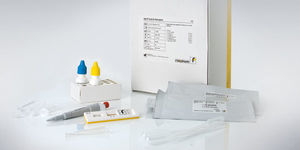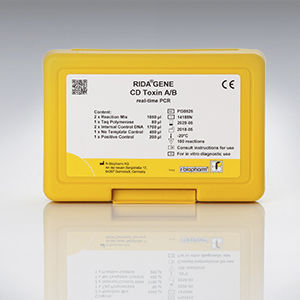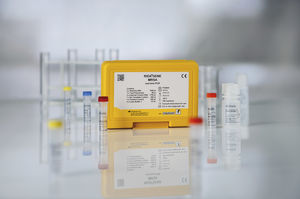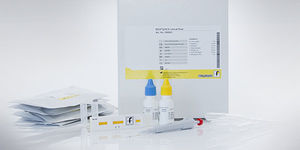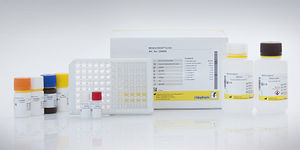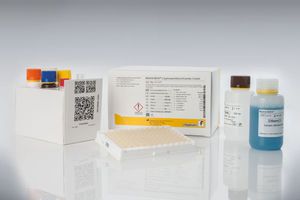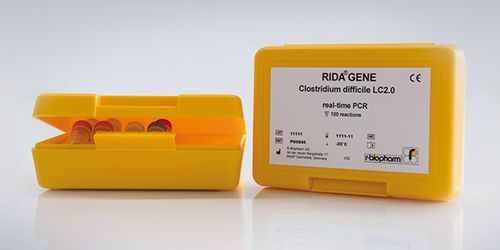
Clostridium difficile test kit PG0835for hospital-acquired infectionsstoolfor real-time PCR
Add to favorites
Compare this product
Characteristics
- Applications
- for hospital-acquired infections
- Micro-organism
- Clostridium difficile
- Sample type
- stool
- Analysis mode
- for real-time PCR
Description
For in vitro diagnostic use. RIDA®GENE Clostridium difficile is a multiplex real-time PCR for the direct, qualitative detection of Clostridium difficile (16s-rDNA) and Clostridium difficile toxin A (tcdA) / B (tcdB) genes from human stool samples and cultures.
The RIDA®GENE Clostridium difficile multiplex real-time PCR can be used as an aid in diagnosis of Clostridium difficile associated diarrhea (CDAD).
General information:
Clostridium difficile, a gram-positive, spore-forming anaerobic bacterium was first described in 1935 by Hall and O’Toole as a component of the intestinal microflora in healthy neonates. In the late 1970s, however, Clostridium difficile was identified as the cause of antibiotica-associated diarrhea and pseudomembranous colitis. Today Clostridium difficile is one of the most common causes of nosocomial diarrhea.
Clostridium difficile is responsible for 15 – 25 % of antibiotica-associated diarrhea and nearly all cases of pseudomembranous colitis. The predisposing risk factors for CDAD are for example antibiotica exposure, advanced age as well as number and duration of hospitalization. However, Clostridium difficile infection is also seen in an increasing number of non-antibiotic-treated and non-hospitalized individuals.
The symptoms range from mild diarrhea to intestinal infections of variable severity, including pseudomembranous colitis, the most severe form of antibiotic-induced inflammatory bowel disease. Clinically symptomatic cases are caused by toxigenic Clostridium difficile strains that produce toxin A and toxin B. In recent years the incidence and severity of Clostridium difficile infections increased worldwide.
Catalogs
No catalogs are available for this product.
See all of R-Biopharm AG‘s catalogsRelated Searches
- Assay kit
- Solution reagent kit
- Blood assay kit
- Serum assay kit
- Immunoassay assay kit
- Plasma assay kit
- Infectious disease detection kit
- Diagnostic reagent kit
- Rapid lateral flow test
- Immunoassay rapid diagnostic test
- Molecular test kit
- Respiratory infection test kit
- Clinical assay kit
- Infectious disease rapid diagnostic test
- Cassette assay kit
- Lateral flow test kit
- COVID-19 detection kit
- ELISA assay kit
- Real-time PCR test kit
- Quality control reagent kit
*Prices are pre-tax. They exclude delivery charges and customs duties and do not include additional charges for installation or activation options. Prices are indicative only and may vary by country, with changes to the cost of raw materials and exchange rates.




